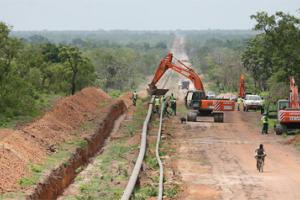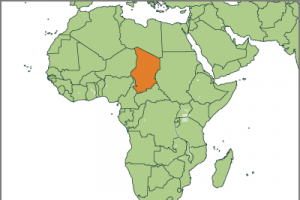Korinna Horta, in UNRID, The Politics of Resource Extraction.
Chad
Other information
4 July 2014
Bulletin articles
4 July 2014
Bulletin articles
8 February 2006
A new report by Friends of The Earth International; “Campagna Per La Riforma Della Banca Mondiale”; CEE Bankwatch Network, and World Economy, Ecology & Development issued in January 2006, highlights the role of the European Investment Bank as financer of so called “development” projects in the South, including Africa. The question raised is: development for whom? The research, entitled “The European Investment Bank In The South. In Whose Interest?”, gives insights around that question.
Other information
13 December 2003
As the global economy expands, pressure on indigenous lands to yield up minerals, oil and gas is intensifying, posing a major threat on them, their lands, territories and the resources that they depend on. The World Bank has been an instrument of such process, supporting mining projects that have been even condemned by the United Nations.
Bulletin articles
31 July 2003
We have already reported extensively the pervasive environmental and social impacts that the Chad-Cameroon oil-pipeline is likely to have (see WRM Bulletins 66, 45, 41, 35, 14 and 2), but there's already a lot to be said of the present impacts of the three-year long World Bank-sponsored project to build a 670-mile pipeline. The pipeline will channel oil from fields in Chad, through thick rainforests inhabited by Pygmy people in Cameroon up to this country's shores at the Atlantic Ocean.
Bulletin articles
2 January 2003
The Chad/Cameroon Oil & Pipeline project (see WRM Bulletins 45, 41, 35, 14 and 2) is reaching critical milestones. Most construction activities are scheduled to be completed by July 2003 and initial oil sales could take place as early as November 2003. As a result, completion of construction is more than a year ahead of schedule which had initially been planned to be finalised by the end of 2004.
Bulletin articles
13 December 2000
By mid 2000 the World Bank approved a polemic 650-mile oil pipeline project to link the Doba oil fields in southern Chad with the Cameroon's Atlantic coast. The project, led by Exxon-Mobil, and sponsored by Chevron and the Malaysian state-owned company Petronas, is the largest of its kind in sub-Saharan Africa.
Bulletin articles
18 June 2000
Facing strong opposition from civil society representatives, the World Bank recently approved a controversial oil and pipeline project led by Exxon-Mobil, that will link oil fields in Chad to Cameroon's Atlantic coast. The project sponsors also include Chevron and Petronas, the Malaysian state company. The total cost of the megaproject will reach U$S 3.7 billion and it will be one of the largest of its kind ever undertaken in sub-Saharan Africa.
Bulletin articles
7 July 1997
An international consortium consisting of Exxon, Shell and ELF is planning a multi-billion dollar oil exploitation project that will involve territories of Chad and Cameroon. It is feared that the project brings with it very serious environmental and social risks that may create another Ogoniland, Nigeria's oil-producing region marked by environmental devastation and brutal Human Rights violations. The project plans the development of the Doba oil-fields in southern Chad, and a 600 mile pipeline through Cameroon to transport oil to an Atlantic port for its export.


